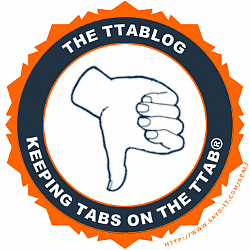The Ten Worst TTAB Decisions of 2006? [Part 2 of 2]
I had a bad dream last night: one of the TTAB Judges had compiled a list of the Ten Worst TTABlog Postings of 2006. I guess I'm feeling a bit uneasy about my TTAB "worst" list, but it's all in good fun -- isn't it? Remember, it takes a skilled carpenter to build a barn, but any jackass can knock it down. With that thought in mind, I present the second batch of "worst" decisions of 2006.

Bose Corp. v. ONG Corp., Opposition No. 91162058 (September 29, 2006). The Board dubiously found a likelihood of confusion between Applicant ONG’s mark WAVETRACE for "audio encoding and decoding circuit boards and software for converting audio content to and from digital audio files," and Bose's registered marks WAVE, ACOUSTIC WAVE, and WAVE/PC for radios, audio tape players, compact disc players, loudspeaker systems, and sound systems coupling a radio to a computer. The Board recognized that the parties' goods are not competitive, but it was captivated by Bose's testimony that "[t]here is a decoding circuit board inside the Wave Music System." Also, "the Wave/PC software has basically a MPE encoder." The Board noted that "there is nothing in the record to indicate that opposer markets these components to makers of finished audio products," but it failed to apply properly the Board's own precedent regarding a party's "zone of natural expansion" and instead leaped to the conclusion that the goods are related: "Because opposer utilizes in its finished products elements that are similar in function to the product of applicant, it would be within opposer's zone of natural expansion to consider marketing such elements to other producers of finished products." (TTABlogged here).
In re Sikorsky Aircraft Corp., Serial No. 78221800 (August 25, 2006). In this questionable decision, the Board reversed a poorly-supported Section 2(e)(4) refusal to register the mark SIKORSKY for sports knives, videogames, jewelry, umbrellas, and other ancillary goods, ruling that the PTO failed to establish a prima facie case. The PTO lamely produced evidence of "only one individual in the entire United States with the surname 'Sikorsky.'" That individual, now deceased, was the founder of Applicant in 1923, Igor Sikorsky, but there was no evidence that he "is well known or that his name has had wide exposure to the purchasing public." Although SIKORSKY was thus the name of someone associated with Applicant -- a factor that would normally weigh in favor of the PTO's position -- the Board questioned "whether this reflects current use as a surname by anyone in the United States or current perception of the term as a surname." Moreover, the Examining Attorney dropped the ball by failing to introduce evidence -- such as the absence of the term "Sikorsky" from dictionaries -- that the term has no meaning other than as a surname. Finally, according to the Board, there was no evidence or explanation to support the PTO’s "conclusory contention" that Sikorsky has the look and sound of a surname [despite the fact that Igor Sikorsky had that surname - ed.]. (TTABlogged here).
In re Truck-Lite Co., Serial No. 76532510 (January 26, 2006). The Board surprisingly reversed a Section 2(e)(1) refusal to register the mark SUPER, finding it not merely descriptive of vehicle lights. The Examining Attorney relied on a dictionary definition, on disclaimers in third-party registrations, and on third-party Supplemental Registrations in maintaining that SUPER “merely describes that applicant's vehicle lighting products 'are of a higher quality or are superior to similar products on the market.'" Applicant argued that the mark is suggestive and not merely descriptive because it does not immediately convey any particular idea about or reveal any characteristic of the goods, because the term is "not normally associated with lighting products for vehicles," and because others in the field have neither used the term nor need to use it. After reviewing the cases cited by the PTO and by applicant, "as well as other Board decisions,” the Board distilled the following strange rule: "in general, if the word 'super' in a mark is combined with the generic name of the goods, or if the goods come in various grades or sizes, then the mark is merely descriptive rather than suggestive." The Board found SUPER to be "suggestive and not merely descriptive," observing that "[t]here is a certain ambiguity about the mark." [So, had Applicant attempted to register SUPER LIGHT, then SUPER would have been descriptive, but without the word LIGHT, it's not? Huh? - ed.] (TTABlogged here).
In re Box Solutions Corp., 79 USPQ2d 1953 (TTAB 2006) [precedential]. The TTAB ignored many of its standard doctrines in reversing a Section 2(d) refusal to register the mark BOX SOLUTIONS & Design (below left) for "computer hardware, namely, communication servers;" the Board found the mark not likely to cause confusion with the registered mark BOX & Design (below right) for "computers and computer peripherals."

It concluded that BOX "is a weak term in the computer industry in that it signifies a computer or computer related device." Ruling that the marks in their entireties "have substantially different appearances and commercial impressions," the Board found confusion not likely. However, the evidence that BOX is a weak mark was feeble, and given that the word “BOX” is the part of the registered mark that would be spoken, BOX should have been considered the dominant portion of that mark. As to Applicant’s mark, with word SOLUTIONS (which appears in much smaller letters) disclaimed, BOX is surely the dominant portion. If, as the Board frequently states, marks are not to be compared in a side-by-side fashion, are the design elements really that important here? Moreover, assuming arguendo that the word BOX is a weak formative, the Board has often said the even weak marks are entitled to protection. And the Board also has often said that even sophisticated purchasers are not necessarily immune to confusion when similar marks are involved. This observer would have found BOX and BOX SOLUTIONS to be confusingly similar, the differing designs notwithstanding. (TTABlogged here).
In re Freiberg, Serial No. 76388348 (June 16, 2006). Here, it was Applicant's decision to employ sarcasm, rather than the Board's ruling, that merited inclusion in this list. Freiberg's caustic arguments failed to overturn the Board’s Section 2(e)(1) and indefiniteness refusals of her mark ALLERGY WIPES for "eyelid wipes." Freiberg came out swinging from the opening bell: "These are facially antithetical positions; if the Examiner cannot understand from the description what the goods are, how can the Examiner be so cocksure of how the mark describes the goods." Freiberg saw herself as the victim of a conniving Examining Attorney who had essentially set a prosecutorial trap: "In an intent-to-use application, an examiner lacks specimens in which an applicant might be caught explaining how a mark relates to the goods. . . . However, if an applicant can’t be relied on to scuttle his own application with specimens, an examiner has another tool that may be applied toward that same end. An indefiniteness objection and requirement for the applicant to describe the goods and their uses in great detail might maneuver the applicant into ponying up evidence of descriptiveness for the examiner." In Freiberg's view, she was caught between Iraq and a hard place: "Thus the only response to the final refusal that Applicant could rely on as acceptable was an amendment to describe the goods in a way the Examiner had determined was merely described by the mark. The clarification requirement appears to have been a gambit to nail down a descriptiveness refusal." The Board, however, saw no such "gambit," nor any ulterior motive in the PTO’s stance: "we would have no difficulty in affirming the descriptiveness refusal with or without the amended identification." In short, Freiberg's aggressive attempt to wipe away the PTO's refusal to register may have raised a few eyelids, but she managed to prove only that sarcasm is an ineffective tool in a TTAB appeal. (TTABlogged here).
Text Copyright John L. Welch 2007.




0 Comments:
Post a Comment
<< Home